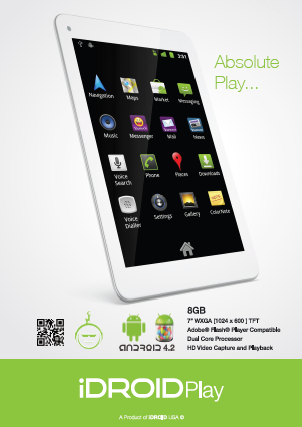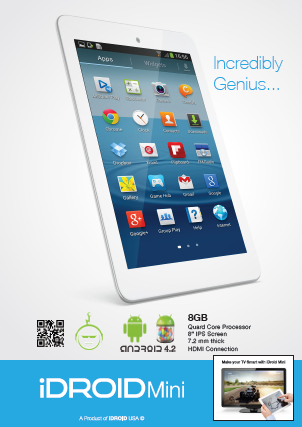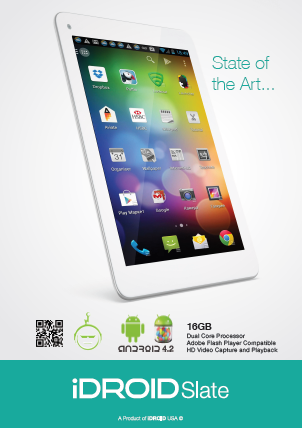Support
Frequently asked questions (FAQ)
• What's the difference between laptops, tablets and smart phones?
• Why do I need a tablet if I have a laptop?
• Why do I need a tablet if I have a smartphone?
• I hear all about apps – what are they and where do I get them?
• What do I need to buy with my tablet to make it work?
• How do I set up my tablet?
• How do I protect my tablet from viruses and other internet threats?
• How many files, apps and other data can I store on my tablet?
What's the difference between laptops, tablets and smart phones?
Tablet PCs are positioned somewhere in the space between smartphones and conventional laptop computers.
The biggest difference between these three types of device is their size, capabilities and ease of use.
Each device has its own merits and none can be replaced directly by either of the other two. Many people are happy to own all three items and use each one depending on their needs, environment and mobility.
Tablets are larger than smartphones, with screens of between 7" and 11", yet smaller and more compact than most laptops, with some weighing under a pound.
They are designed to be ultra-portable, super functional computers that are compact enough to slip into a small bag or purse. But it's not only their web connectivity and slim design that make tablets so popular – it's also their slick new interactive screen technology.
With the flick of a finger, you can surf, email and use social networking sites. You can organize your life, share files, manage photographs, play games and watch movies – all on a usefully-sized screen with razor-sharp resolution.
And you can do it all without the awkwardness of a heavier laptop with its flip-up screen, or the frustration of trying to read material on a smartphone screen the size of a business card.
Why do I need a tablet if I have a laptop?
With their larger screens, high-end specs and conventional keyboards, the latest laptops do what they do well – heavy-duty information creation, data processing and industry-level productivity.
It's likely you don't need this kind of capability day-to-day, but still want fast online interactivity and high performance communication and organization tools. If so, an ultra–slim tablet is an excellent alternative, plus it's a fraction of the weight.
Throw in an intuitive operating system, touch-sensitive screen and a use-anywhere format, and you'll find that in most environments a tablet will give you a much more convenient experience than any laptop.
Tablets are also better for viewing and sharing information with others around you – the high definition glass screen is viewable from all angles plus, thanks to smart new technology, displayed content instantly orientates itself, regardless of which way you hold your device.
Why do I need a tablet if I have a smartphone?
There will always be a place for compact, pocket-sized phones that make use of wireless, cellular networks. But, in the Internet age, our ability to talk wherever we are is only part of the story. We also want all our personal and business information to be easily accessible, easily consumed and easily shared. And it's here that tablets really score over smart phones.
Touch–sensitive tablet screens allow information to be viewed much more clearly than it is on a smartphone – anyone who has struggled to read faxes, spreadsheets, PDFs, web pages or reports on a 3" phone screen will be familiar with its limitations.
Compare this with a typical tablet screen size of between 7" and 11" and you'll see how much easier document-viewing becomes. Add in simple touch screen interactivity that allows pages to be moved, magnified, reduced and ordered with the flick of a finger and you'll get a better idea of why these devices are really taking off.
It's true that smartphones are great for receiving emails when traveling around, but tablets make it much easier to review and respond to individual messages – thanks to their larger screen size and virtual, touch-sensitive keyboard. In fact the whole tablet environment, including font size, can be adjusted to suit your preference.
Don't forget that you can also make voice, video or conference calls using VoIP systems such as Skype and Google more easily than ever before. These networks also enable file sharing and instant messaging, too. So wherever you are – in a train, a plane or a car, or waiting in an airport, a bar or a shopping mall – with a headset and an Internet connection, you can be on message whenever you need to be.
I hear all about apps – what are they and where do I get them?
Apps (shorthand for 'applications') are packets of software which are easy to identify, easy to download and easy to use.
Precisely what each app will do for you is clearly defined, so you can decide quickly whether or not they are worth having. Some apps are free, but you will have to pay for others when you download them to your tablet.
Some of the most popular lifestyle apps include Facebook, Angry Birds, YouTube and Skype. Once downloaded to your tablet, these apps, and many others like them, open the door to a world of personalized online gaming, communicating, social networking, shopping and organising.
Business is also well catered-for by apps developers. Among the best-known work-oriented apps are Linkedin, OneNote, WebEx and Weatherbug, and all are designed to maximise your productivity and connectivity – wherever you happen to be.
Tablets that run the Honeycomb operating system, such as the Motorola XOOM, can be updated with all the apps you need at the Android Market Here, you'll find all the Android-based apps that have been specifically-developed with this operating system in mind.
If your phone runs the BlackBerry OS, then BlackBerry App World is the equivalent resource for all the latest apps designed for these products.
Both of these websites allow you to can review thousands of apps and download those you need for business and leisure. There are thousands more apps in development, covering everything from lifestyle, shopping and entertainment to family, business and social networking.
What do I need to buy with my tablet to make it work?
Tablets are by far the easiest, most portable computer solution when it comes to consuming and sharing information on the go. All the tablets at iDroid are Wi-Fi-enabled right out of the box, so you can be up and running in no time
One of the best ways to take advantage of your tablet's portability is to use it with a Wi-Fi router. This will generally give you a solid, wireless online connection wherever you are in your home or office.
If you already have a wireless router, then your signal should be detectable straight away and you're all set to surf.
If you want to adapt and personalize your tablet experience, there's a whole range of high quality accessories available from iDroid . From protective cases that double as viewing stands to full-sized keyboards and docking cradles that charge your tablet's batteries while you work.
And to protect your tablet from accidents, mechanical failure and loss, our protection stuff is coming soon!!
How do I set up my tablet?
Tablets are designed to work easily straight out of the box. Once you've spent some time using yours, everything will become familiar and you'll quickly learn how to get the best experience from it.
But what if you've never used a tablet before and need a helping hand with initial set up?
Naturally, iDroid has the solution. We offer an in-store set up and training service, or we'll come to you with our onsite set up option.
With both of these one of our tech experts will make sure your device settings are up to date and secure, get you familiar with the main features, configure your email and set all your options so that your tablet works exactly the way you want it to.
If you prefer phone support, please refer to our phone support list below.
iDroid Tech Support:
(832) 641-8041
How do I protect my tablet from viruses and other internet threats?
Your data, including personal files, games, movies and music are all valuable, and we understand that the prospect of losing them, while remote, is always a possibility.
The good news is that security software comes pre-installed in many tablets, plus at iDroid we have a range of anti-virus and encryption solutions available to help give you added peace of mind.
In addition, security products are available from tablet manufacturers' app websites using the same pay-per-download system used for the delivery of mainstream apps.
It's also a good idea to invest in an external hard drive and back up your tablet's contents frequently. At iDroid we have a range of quality devices perfectly suited for backups. They all come with software that makes it easy to manually or automatically capture your valuable data so you don't have to worry about keeping it all in one place.
How many files, apps and other data can I store on my tablet?
Tablets come with a variety of data storage sizes that are expressed in GB (gigabytes). Currently, these range between 1GB and 64GB. This storage is the amount of room available to you for data and software, so the model you choose and how much of this capacity you will need depends upon how you use your tablet.
Your tablet will quickly become central to your everyday life and work. And like most people you'll start collecting movies, photos, apps, games and other data. Over time, this material will start to eat into your storage capacity.
Whatever your needs, at iDroid we have a range of accessories that give you the data storage flexibility you want. One way to guarantee you never have to worry about space is to get your hands on a Micro SD card and a network storage external hard drive. Micro SD increases the capacity on your tablet and the external network storage hard drive allows you to store and access all of your data safely and securely.
The two of these will give you a neat backup solution so you'll never have to worry about data loss – everyone's worst nightmare.

 Default Store View
Default Store View Kenya
Kenya  Mexico
Mexico 




